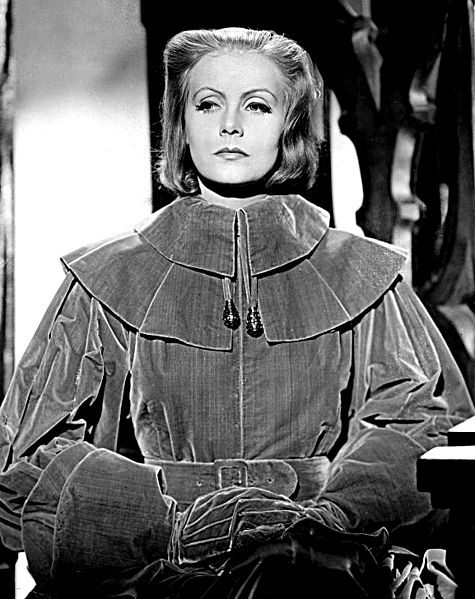It´s 1928, and young Vendela Berg is crossing the Atlantic on her way to America, to work as a bookkeeper at her uncle´s firm. She is traveling economy, but by bribing the staff, she hangs around the first class deck, attracted by the presence of the greatest movie star of the time: Greta Garbo, who is on her way back to Hollywood after a visit in the old country. Garbo has already made a name of herself being a very reluctant and shy celebrity, fleeing her admirers in Stockholm.
 |
| Garbo in Stiller´s "Gösta Berlings Saga", from Wikipedia |
For some reason, Garbo is attracted to Vendela too, and she is offered employment as Greta´s social secretary, a kind of personal assistant/lady´s companion, to handle her affairs and live with her in Hollywood. She orders Vendela to loose weight, to better fit into her clothes, and teaches her to pretend to be her, this way attracting diverting attention when Greta wants to slip away unnoticed.
Mattson works in first-person narrative, and through Vendela enables us to see Garbo both from a distance and from within, as Vendela and Greta at times almost seem to be the same person, sharing the same experiences and feelings. And you can interpret their relationship as two sides of Garbo´s personality, Greta being the emotionally driven, mostly by fear, and Vendela being the rational, thinking, clever one.
 |
| From Ross Verlag. |
"... jag trodde på allt han sa. Det gör jag än, för allt han sa var sant. När direktörerna på Metro talade om för mig att jag var en kossa som inte gick att filma nedanför naveln visade han dem vem jag var, han höll själv i kameran och förklarade hur jag skulle röra mig: stanna vid fönstret, dra undan gardinen, böj huvudet bakåt! Jag fanns knappt innan dess. Jag visste inte vem jag var. Han visade mig för mig själv, jag tittade på provfilmen och tänkte: så detta är jag. Jag hade plötsligt börjat finnas." "... I believed everything he said. I still do, because everything he said was true. When the managers at Metro told me I was a cow who couldn´t be filmed below the navel, he showed them who I was, he held the camera himself and explained how I should move: stand by the window, pull the curtain, bend your head back! I hardly existed before then. I didn´t know who I was. He showed me to myself, I saw the screen test and thought: so, this is me. I had suddenly come to life."
 |
| Garbo as Queen Christina, from Wikipedia |
In the end, does Vendela ever get close to the real Garbo? They live together for seven years, is that enough? Is Greta being entirely open, entirely honest? Is she the only person in Hollywood who doesn´t act, who is just being herself, a naturally shy woman of integrity, who just wants to be left alone?
This novel is about Greta Garbo, and yet, it´s not. Towards the end of the story Vendela says, and this very much sums up the entire novel:
I am not going to reveal how it ends. And there is more than one way to interpret this novel. I read a critic in one of the major Swedish newspapers who thinks this is, above all, a novel about female friendship. I say: what? I don´t find that to be a major theme at all. If anything, I find the relationships more metaphorical than real. I think this is a story that can be looked at from a number of different angles, concerning authenticity, projection, integrity, honesty, courage, and other things. In that way, the story is as enigmatic (or, as projectionable) as Garbo´s beautiful face."Under alla de år jag kände Greta pratade hon bara när det passade henne och svarade bara på en bråkdel av mina frågor. Tyst sträckte hon ut handen och rörde vid tekannan, sockerskålen, brödkorgen, askkoppen, lampfoten, allt som fanns inom räckhåll, allt som fanns i den verkliga världen och gick att ta på, och sedan vände hon sig mot fönstret där gråa sjok av blötsnö gled över glaset och då såg det ut som om hon tänkte på sin vän, hans ensamma död, snöns ensamhet när den faller ur en stor svart rymd och försvinner i vattnet, sugs upp av modden på den våta gatan eller rinner som tårar på glaset. Men det var jag som tänkte på allt det där. Det går inte att berätta en annan människas historia." "In all the years I knew Greta she only talked when it suited her and only answered a fraction of my questions. Quietly she put out her hand and touched the teapot, the sugar bowl, the breadbasket, the ashtray, the lampstand, everything that was within reach, everything that was in the real world and could be touched, and then she turned towards the window where grey chunks of wet snow slid over the glass, and in those moments it looked as if she was thinking about her friend, his lonely death, the solitude of the snow when it falls from a black sky and disappears into the water, is sucked up by the slush on the wet street or runs like tears on the glass. But it was I who was thinking all that. It is not possible to tell another person´s story."
Young Greta, Wikipedia
I highly recommend this to anyone who can get their hands on it. It´s hard to say how Mattson sounds in English, but the original prose is... well, delightful. Amazing. Truly clever.


No comments:
Post a Comment